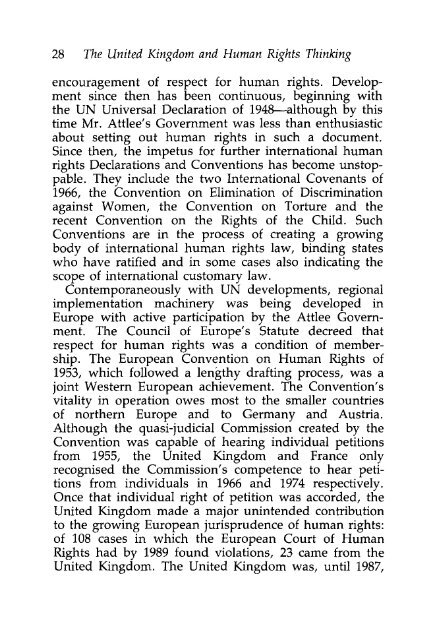The United Kingdom and Human Rights - College of Social ...
The United Kingdom and Human Rights - College of Social ...
The United Kingdom and Human Rights - College of Social ...
You also want an ePaper? Increase the reach of your titles
YUMPU automatically turns print PDFs into web optimized ePapers that Google loves.
28 <strong>The</strong> <strong>United</strong> <strong>Kingdom</strong> <strong>and</strong> <strong>Human</strong> <strong>Rights</strong> Thinking<br />
encouragement <strong>of</strong> respect for human rights. Development<br />
since then has been continuous, beginning with<br />
the UN Universal Declaration <strong>of</strong> 1948—although by this<br />
time Mr. Attlee's Government was less than enthusiastic<br />
about setting out human rights in such a document.<br />
Since then, the impetus for further international human<br />
rights Declarations <strong>and</strong> Conventions has become unstoppable.<br />
<strong>The</strong>y include the two International Covenants <strong>of</strong><br />
1966, the Convention on Elimination <strong>of</strong> Discrimination<br />
against Women, the Convention on Torture <strong>and</strong> the<br />
recent Convention on the <strong>Rights</strong> <strong>of</strong> the Child. Such<br />
Conventions are in the process <strong>of</strong> creating a growing<br />
body <strong>of</strong> international human rights law, binding states<br />
who have ratified <strong>and</strong> in some cases also indicating the<br />
scope <strong>of</strong> international customary law.<br />
Contemporaneously with UN developments, regional<br />
implementation machinery was being developed in<br />
Europe with active participation by the Attlee Government.<br />
<strong>The</strong> Council <strong>of</strong> Europe's Statute decreed that<br />
respect for human rights was a condition <strong>of</strong> membership.<br />
<strong>The</strong> European Convention on <strong>Human</strong> <strong>Rights</strong> <strong>of</strong><br />
1953, which followed a lengthy drafting process, was a<br />
joint Western European achievement. <strong>The</strong> Convention's<br />
vitality in operation owes most to the smaller countries<br />
<strong>of</strong> northern Europe <strong>and</strong> to Germany <strong>and</strong> Austria.<br />
Although the quasi-judicial Commission created by the<br />
Convention was capable <strong>of</strong> hearing individual petitions<br />
from 1955, the <strong>United</strong> <strong>Kingdom</strong> <strong>and</strong> France only<br />
recognised the Commission's competence to hear petitions<br />
from individuals in 1966 <strong>and</strong> 1974 respectively.<br />
Once that individual right <strong>of</strong> petition was accorded, the<br />
<strong>United</strong> <strong>Kingdom</strong> made a major unintended contribution<br />
to the growing European jurisprudence <strong>of</strong> human rights:<br />
<strong>of</strong> 108 cases in which the European Court <strong>of</strong> <strong>Human</strong><br />
<strong>Rights</strong> had by 1989 found violations, 23 came from the<br />
<strong>United</strong> <strong>Kingdom</strong>. <strong>The</strong> <strong>United</strong> <strong>Kingdom</strong> was, until 1987,

















